Politics of England
| This article is part of a series within the Politics of the United Kingdom on the |
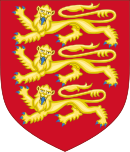 |
|---|
Politics of England forms the major part of the wider politics of the United Kingdom, with England being more populous than all the other countries of the United Kingdom put together. As England is also by far the largest in terms of area and GDP, its relationship to the UK is somewhat different from that of Scotland, Wales or Northern Ireland. The English capital London is also the capital of the UK, and English is the dominant language of the UK (not officially, but de facto). Dicey and Morris (p26) list the separate states in the British Islands. "England, Scotland, Northern Ireland, the Isle of Man, Jersey, Guernsey, Alderney, and Sark.... is a separate country in the sense of the conflict of laws, though not one of them is a State known to public international law." But this may be varied by statute.
The United Kingdom is one state for the purposes of the Bills of Exchange Act 1882. Great Britain is a single state for the purposes of the Companies Act 1985. Traditionally authors referred to the legal unit or state of England and Wales as "England" although this usage is becoming politically unacceptable in the last few decades. The Parliament of the United Kingdom is located in London, as is its civil service, HM Treasury and most of the official residences of the monarchy. In addition, the state bank of the UK is known as the "Bank of England".
Though associated with England for some purposes, the Isle of Man, Jersey and Guernsey have their own parliaments, and are not part of the United Kingdom, the European Union or England.
Prior to the

History
Pre-Union politics
The
- In an age lacking precise definitions of constitutional relationships, the deeply ingrained custom that the king governed in consultation with the Witan, implicit in almost every important royal document of the period, makes the Witenagemot one of Anglo-Saxon England's fundamental political institutions.[1]
In 1066,
In 1265,
This set the scene for the so-called "Model Parliament" of 1295 adopted by Edward I. By the reign of Edward II, Parliament had been separated into two Houses: one including the nobility and higher clergy, the other including the knights and burgesses, and no law could be made, nor any tax levied, without the consent of both Houses as well as of the Sovereign.
The
When
Amidst fears of a Roman Catholic succession, the
Post-Union politics

- Treaty of Union agreed by commissioners for each parliament on 22 July 1706.
- Acts of Union 1707, passed by both the Parliament of England and the Parliament of Scotland to form the Kingdom of Great Britain.
- Act of Union 1800, passed by both the Parliament of Great Britain and the Parliament of Ireland to form the United Kingdom of Great Britain and Ireland.
Once the terms of the
After the
European Parliament
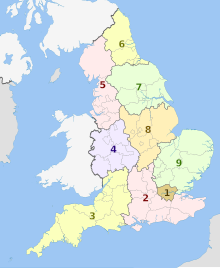
When the United Kingdom was a member of the European Union, members of the
| Constituency | Region | Seats | Pop. | per Seat |
|---|---|---|---|---|
| 1. London | Greater London | 9 | 7.4m | 822k |
| 2. South East England | South East | 10 | 8m | 800k |
| 3. South West England | South West, Gibraltar | 7 | 4.9m | 700k |
| 4. West Midlands | West Midlands | 7 | 5.2m | 740k |
| 5. North West England | North West | 9 | 6.7m | 745k |
| 6. North East England | North East | 3 | 2.5m | 833k |
| 7. Yorkshire and the Humber | Yorkshire and the Humber | 6 | 4.9m | 816k |
| 8. East Midlands | East Midlands | 6 | 4.1m | 683k |
| 9. East of England | East of England | 7 | 5.4m | 770k |
Post-devolution politics
While
The
While Scotland and Northern Ireland have always had separate
Regarding parliamentary matters, an anomaly called the
However, legislation was still subject to a vote of the entire House of Commons and this frequently led to legislation being passed despite the majority of Scottish MPs voting against. (This was especially true during the period of Conservative rule from 1979 to 1997 when the Conservative Party had an overall majority of MPs but only a handful representing Scotland and Wales.) Now that many Scottish matters are dealt with by the Scottish Parliament, the fact that MPs representing Scotland, Wales and Northern Ireland can not vote on those issues as they affect Scotland, but can vote on those same issues as they affect England caused some disquiet. In 2015 English votes for English laws was passed by Westminster to solve this by giving English MPs a veto on legislation.
The Campaign for an English Parliament is a proponent of a separate English parliament.
Parliament of the United Kingdom

The Parliament of the United Kingdom is located at Westminster in London.
House of Commons
English members of parliament are elected at the same time as those for the rest of the UK. There are 533 English constituencies. Because of their large number, they form an inbuilt majority in the House of Commons. Even though Clause 81 of the Scotland Act 1998 equalised the English and Scottish electoral quota, and thereby reduced the number of Scottish members in the House of Commons from 72 to 59 MPs.
English Grand Committee
For many years an anomaly known as the
House of Lords
The House of Lords also has an inbuilt English majority.
Members of the House of Lords who sit by virtue of their ecclesiastical offices are known as the
The number of Lords Spiritual was further restricted by the
Devolution
Former regional assemblies
After power was to be devolved to Scotland, Northern Ireland and Wales without a counterweight in England, a series of referendums were planned to establish elected regional assemblies in some of the regions. The first was held in
A
Greater London Authority
Greater London has a certain amount of devolution, with the London Assembly and the directly elected Mayor of London. The Assembly was established on 3 July 2000, after a referendum in which 72% of those voting supported the creation of the Greater London Authority, which included the Assembly along with the Mayor of London. The referendum and establishment were largely contiguous with Scottish and Welsh devolution.
In Greater London, the 32
The
There is also a London political party,
('Devolved Regions' via) Metro Mayors
Localism saw limited return of regional devolution, with devolved powers for (Metro) city expansion and super-councils.
In 2014 it was announced that a
'England only' departments of the British Government
Several
- The Ministry of Housing, Communities and Local Government.
- The Department for Education is responsible for issues affecting people in England up to the age of 19.
- The fisheriesand rural communities in England.
Non-ministerial government departments
Non-ministerial government departments of the British Government administer much of England's affairs. Responsibility for them is not devolved.
- Forestry Commission
- The Office for Standards in Education, Children's Services and Skills (Ofsted) which is a non-ministerial department headed by Her Majesty's Chief Inspector of Schools in England.
- Office of Qualifications and Examinations Regulation (Ofqual)
- Water Services Regulation Authority (Ofwat) (England and Wales)
- Charity Commission for England and Wales
- Crown Prosecution Service (England and Wales)
- Her Majesty's Land Registry (England and Wales)
- The National Archives (England and Wales)
- Planning Inspectorate (England and Wales)
- Food Standards Agency (England and Wales, Northern Ireland)
- Serious Fraud Office (England and Wales, Northern Ireland)
Other departments deal mainly with matters affecting England though they also have some UK wide responsibilities in certain areas;
- The National Health Service in England(NHS).
- The Department for Transport
- The Department for Digital, Culture, Media and Sport
Other bodies with responsibilities for England alone include:
- English Heritage
- Historic England
- National Highways
- Homes England
- Regulator of Social Housing
- Tenant Services Authority
- Public Health England
- Genomics England
- Community Health Partnerships
- NHS Property Services
- NHS Professionals
- NHS Shared Business Services
- NHS Supply Chain
- Supply Chain Coordination Limited
- General Social Care Council
- Office for Students
Local government
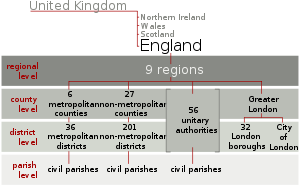
For the purposes of local government, England is divided into as many as four levels of administrative divisions. At some levels, various legislation has created alternative types of administrative division.
Districts in England may also have the status of
The metropolitan counties were divided into metropolitan districts which are usually called boroughs. When the county councils were abolished the metropolitan districts gained much of their powers and therefore function similar to other unitary authorities.
Shire counties are divided into non-metropolitan districts. Power is shared with the county council, but shared differently from the metropolitan counties when first created.
The
Political parties
The Green Party of England and Wales has had an amicable split from Scottish counterpart, and the Wales Green Party section is semi-autonomous.
The
The
The Liberal Democrats have nominally separate Scottish, Welsh and English parties.
In spite of seeking independence of the United Kingdom from the European Union, both the UK Independence Party (UKIP) and Reform UK do not support further onward devolution to England, although support scrapping the Barnett formula.
Minor political parties
Most of the parties that only operate within England alone tend to be purely interested in English issues, like
Church of England
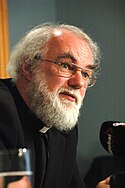
The Church of England is the officially established Christian church[6] in England. King Charles III is the official head of the church, with the title Supreme Governor of the Church of England, while the Archbishop of Canterbury is the head clergyman. The canon law of the Church of England states, "We acknowledge that the King's most excellent Majesty, acting according to the laws of the realm, is the highest power under God in this kingdom, and has supreme authority over all persons in all causes, as well ecclesiastical as civil." In practice this power is often exercised through Parliament and the Prime Minister.
Of the forty-four diocesan
Monmouthshire
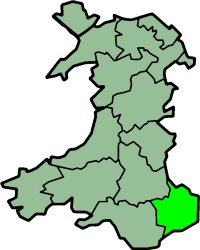
The historic county of Monmouthshire, lying in the Welsh Marches (the Anglo-Welsh border), is a bone of contention for some English nationalists.[8] Although the county is now mostly in Wales, to add to the confusion, Welsh Bicknor was an exclave of the county, and is in Herefordshire (England). The Welsh Border has historically been more fluid than the Anglo-Scottish border
Monmouthshire's Welsh status was ambiguous until relatively recently, with it often thought of as part of England. The entirety of Wales was made part of the
The
The relevant section of the Act states that "one Knight shall be chosen and elected to the same Parliaments for every of the Shires of Brecknock, Radnor, Montgomery and Denbigh, and for every other Shire within the said Country of Dominion of Wales". As Monmouthshire was dealt with separately it cannot be taken to be a shire "within the said Country of Dominion of Wales". The
The issue was finally clarified in law by the
However, the issue has not gone completely away, and the English Democrats nominated candidates for the 2007 Welsh Assembly elections in three of six constituencies in the area of the historic county with a view to promoting a referendum on 'Letting Monmouthshire Decide' whether it wished to be part of Wales or England.[10] The party received between 2.2% and 2.7% of the vote (a much lower total than Plaid Cymru) and failed to have any members elected.[11]
Berwick-upon-Tweed

The status of Berwick, north of the River Tweed is controversial, especially amongst Scottish nationalists.[12] Berwick remained a county in its own right until 1885, when it was included in Northumberland for Parliamentary purposes. The Interpretation Act 1978 provides that in legislation passed between 1967 and 1974, "a reference to England includes Berwick upon Tweed and Monmouthshire".
In 2008, SNP MSP Christine Grahame made calls in the Scottish Parliament for Berwick to become part of Scotland again, saying
- "Even the Berwick-upon-Tweed Borough Council leader, who is a Liberal Democrat, backs the idea and others see the merits of reunification with Scotland."[13]
However, Alan Beith, the Liberal Democrat MP for Berwick, said the move would require a massive legal upheaval and is not realistic.[14] However he is contradicted by another member of his party, the Liberal Democrat MSP Jeremy Purvis, who was born and brought up in Berwick. Purvis has asked for the border to be moved twenty miles south (i.e., south of the Tweed) to include Berwick borough council rather than just the town, and has said:
- "There's a strong feeling that Berwick should be in Scotland, Until recently, I had a gran in Berwick and another in Kelso, and they could see that there were better public services in Scotland. Berwick as a borough council is going to be abolished and it would then be run from Morpeth, more than 30 miles away.".[15]
According to a poll conducted by a TV company, 60% of residents favoured Berwick rejoining Scotland.[16]
Cornwall
Most English people and the UK government regard Cornwall as a county of England, but Cornish nationalists believe that the Duchy of Cornwall has a status deserving greater autonomy. Campaigners including Mebyon Kernow, a Cornish nationalist party, and all five Cornish Liberal Democrat MPs oppose participation in the South West Regional Assembly alongside Devon, Dorset, Gloucestershire, Somerset and Wiltshire in favour of a democratically elected Cornish Assembly.[17][18][19]
See also
- National Health Service in England
- Outline of England
- List of active autonomist and secessionist movements
- Political parties in England
- Politics of Scotland
- Politics of Wales
- Politics of Northern Ireland
- Politics of Guernsey
- Politics of Jersey
- Politics of the Isle of Man
- Duchy of Lancaster
- Duchy of Cornwall
Sources
Footnotes
- ^ C.Warren Hollister, The Making of England, 55 B.C. to 1399 (7th ed. 1996) p 82
- ^ "English vote plan to become law despite objections". BBC News. 22 October 2015.
- ^ eGov monitor – Planning transfer undermines democracy Archived 19 February 2008 at the Wayback Machine. 29 November 2007
- ^ "Johnson accused of 'dubious U-turn' after saying he would keep funding formula he previously criticised".
- ^ "No English parliament – Falconer". BBC News. 10 March 2006. Retrieved 20 January 2008.
- ^ "The History of the Church of England". The Archbishops' Council of the Church of England. Retrieved 24 May 2006.
- ^ House of Lords: alphabetical list of Members Archived 2 July 2008 at the Wayback Machine. Retrieved on 12 December 2008.
- ^ "Monmouth Web Community - History - Wales". Archived from the original on 4 February 2005.
- ^ Local government Act 1972 (c.70), sections 1, 20 and 269
- ^ "English Democrats Party Campaigning for an English Parliament". Archived from the original on 7 August 2018.
- ^ "Election 2007 | Welsh Assembly | Election Result: Wales". BBC NEWS. 7 May 2007. Archived from the original on 11 November 2022.
- ^ Kerr, Rachel (8 October 2004). "A tale of one town". BBC News. Archived from the original on 10 July 2012.
- ^ "'Return to fold' call for Berwick". BBC News. 10 February 2008. Archived from the original on 1 May 2023.
- ^ Hamilton, Alan (13 February 2008). "Berwick thinks it's time to change sides ... again". The Times. London. Retrieved 14 February 2008.[dead link]
- ^ The Sunday Post, 10 February 2008, Scots plan to capture 20 miles of England
- ^ TV poll backs Berwick border move BBC News, 17 February 2008
- ^ MP Andrew George campaigns for a Cornish Assembly Archived 28 September 2007 at the Wayback Machine
- ^ 50,000 petition for Cornish Assembly
- ^ Cornish Lib Dems support the proposal for a Cornish Assembly Archived 28 September 2007 at the Wayback Machine
References
- Dicey & Morris (1993). The Conflict of Laws. Sweet & Maxwell. ISBN 0-420-48280-6.

